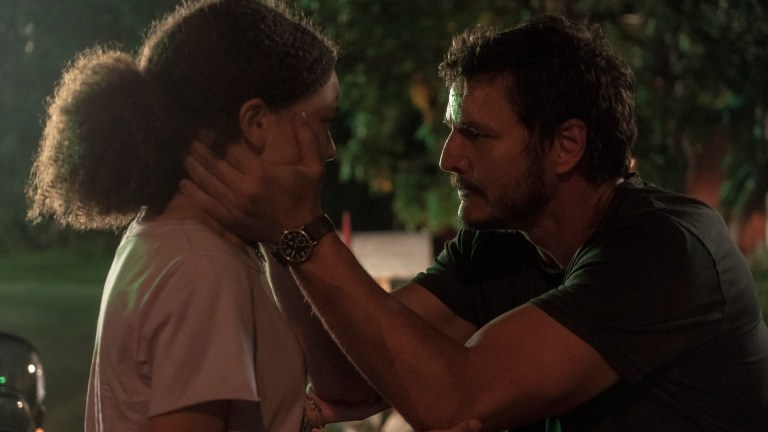The Last of Us Episode 1 Review: Does the TV Series Live Up to the Game?
HBO's The Last of Us TV series is finally here. Was it worth the wait?

This Last of Us review contains spoilers.
The Last of Us Episode 1
The Last of Us holds a special place in gamers’ hearts for many reasons, one of them being the fact that it’s arguably one of the most cinematic games ever made. So when it was announced that the game would be adapted to TV by HBO, several questions naturally arose from the fanbase. Does such a game that’s already so cinematically rich really need to be adapted to screen? Will the new actors live up to the performances of the original cast? Will a new format mean changes to the original story?
Judging from the first episode of HBO’s The Last of Us, fans have nothing to fear — other than the infected fungal monstrosities waiting at every turn in this refreshingly faithful adaptation. As longtime fans might expect, episode 1 covers the game’s infamous prologue, the 20-year time jump that follows in Joel’s story, and the introduction of The Last of Us’ unique brand of dystopia. While it isn’t a beat-for-beat recreation of the game’s first act, the adjustments and additions to the story are tasteful and, in certain respects, actually improve upon the original.
While on the surface this is a horror tale set in a post-apocalyptic world riddled with infected mushroom monsters, like most good genre shows of its ilk, The Last of Us is really about relationships. In this case, the relationship between survivor Joel (Pedro Pascal), who’s haunted by the loss of his daughter 20 years ago, and Ellie (Bella Ramsey), a strong-willed teenager harboring a massive secret.
The show also adds a few new narrative wrinkles to the proceedings, such as a flashback to a 1968 talk show on which an epidemiologist (John Hannah) explains that fungi are a much greater threat to humankind than any virus, being that in certain cases, fungi can take control over the bodies of living hosts like ants and, potentially, humans. The word “pandemic” is uttered prominently, and global warming is alluded to as well. While none of this is in the game, it adds a welcome element of real-world context that grounds the story in a meaningful way.
The story then jumps to 2003, introducing us to young Sarah Miller (Nico Parker), her father Joel, and his brother Tommy (Gabriel Luna), who together try to make it out of Austin alive during the emergence of the cordyceps outbreak. One of the masterstrokes of the game was putting the player in control of Sarah for a while, which makes her subsequent death at the end of the prologue all the more devastating. The show obviously can’t offer us the same type of immersion, but what it does offer is more time with Sarah as she goes about her day, getting her dad’s watch repaired for his birthday, and visiting their neighbors. Parker’s performance is warm and compassionate to boot, which makes the prologue’s gut punch ending just as, if not more, hard-hitting than the game’s.
It comes as no surprise that Pascal is terrific as the gruff, grumpy Joel, as he’s pretty much great in any role he plays. What’s unexpected, though, is how much he resembles Joel from the game. His voice is a close match with Troy Baker’s original portrayal of the character, but what’s even more striking is his physicality. When you see him from behind, he at times looks uncannily like the game model. None of this was a prerequisite, mind you—Parker doesn’t resemble the game version of Sarah at all, and she’s nonetheless fantastic. But it’s an added bonus that Pascal looks and sounds so much like the Joel fans already know.
Looks aside, Pascal’s portrayal is simply riveting. When the story jumps ahead 20 years and we find Joel in a ravaged Boston, working macabre odd jobs for FEDRA, the last remnants of the US government, you can feel the years of brutal post-apocalyptic survivalism and grieving for Sarah has taken its toll on him, and that he’s harboring some serious regret and self-loathing. As we’re introduced to more of the world, we meet his confidant Tess (Anna Torv, who matches Pascal’s nuance and attention to detail), the leader of the revolutionary Fireflies Marlene (Merle Dandridge, who reprises her role from the game), and of course, Ellie, who Marlene tasks Joel and Tess to smuggle out of the city.
Ramsey was a standout on Game of Thrones as the fearless Lyanna Mormont, and her natural ability to embody someone beyond her years despite her age and diminutive stature is on full display in her turn as Ellie as well. She, Pascal, and Torv don’t feel like they’re just copying their video game counterparts—they’ve brought their own take on the material. But the material itself—particularly the dialogue—doesn’t stray far from the game’s script, at times lifting lines word for word. This is a good thing, considering how strong the source material is.
This is can’t be overstated: Pascal and Ramsey are magic together. Watching Joel recoil at the prospect of connecting with a girl near Sarah’s age is heartbreaking, and Ramsey is pitch-perfect in capturing the crux of Ellie, which is that despite the messed up state of the world she’s grown up in, she miraculously maintains a sense of hope and wonder that shields her from corruption—to a point. Ramsey also really lands the smart-ass and gutsy side of Ellie.
But The Last of Us series isn’t just acclaimed for the characters and writing. The show also absolutely nails the aesthetic of the games and adapts it to television seamlessly. The earth tones, the rich lighting, the stark levels of saturation, the vegetation and foliage overtaking abandoned buildings and roads—it all feels right, especially if you’ve already experienced this world firsthand on PlayStation. You can almost smell the desecration and despair wafting through the Boston streets as Joel hauls the body of an executed boy (who we meet earlier in the episode…brutal) to a pyre for FEDRA.
The final scene of the episode is brilliant in that it sets up the emotional stakes for the show. When Joel, Ellie, and Tess are held at gunpoint by the FEDRA soldier Joel’s been dealing pills to on the side as they’re on their way out of the quarantine zone, we see a fleeting image of Joel cradling Sarah right before she was shot. As he proceeds to turn the soldier’s face to mush with his fists, the haunting realization emerges that, deep down, he sees Sarah in Ellie, which by the looks of things makes him both a dangerous man and a deeply disturbed one.
With Chernobyl’s Craig Mazin at the helm as showrunner and the game’s director Neil Druckmann onboard as a co-showrunner, HBO’s The Last of Us has every chance to be a worthy adaptation of one of the best video games of all time. Time will tell if the show will go on to live up to the game’s legacy and, just maybe, be the best video game adaptation of all time. But if this first episode is any indication, Mazin and co. are right on track.
